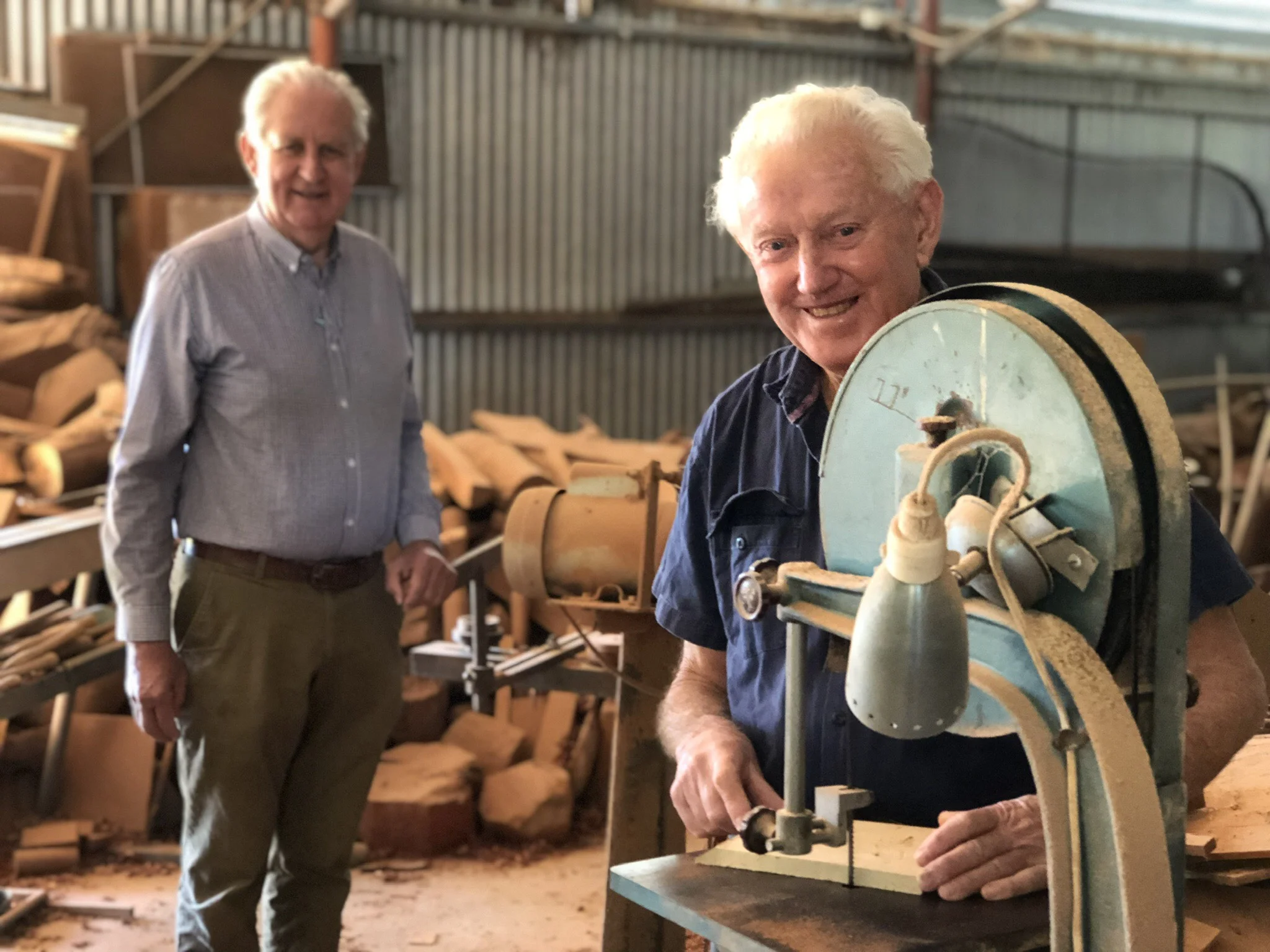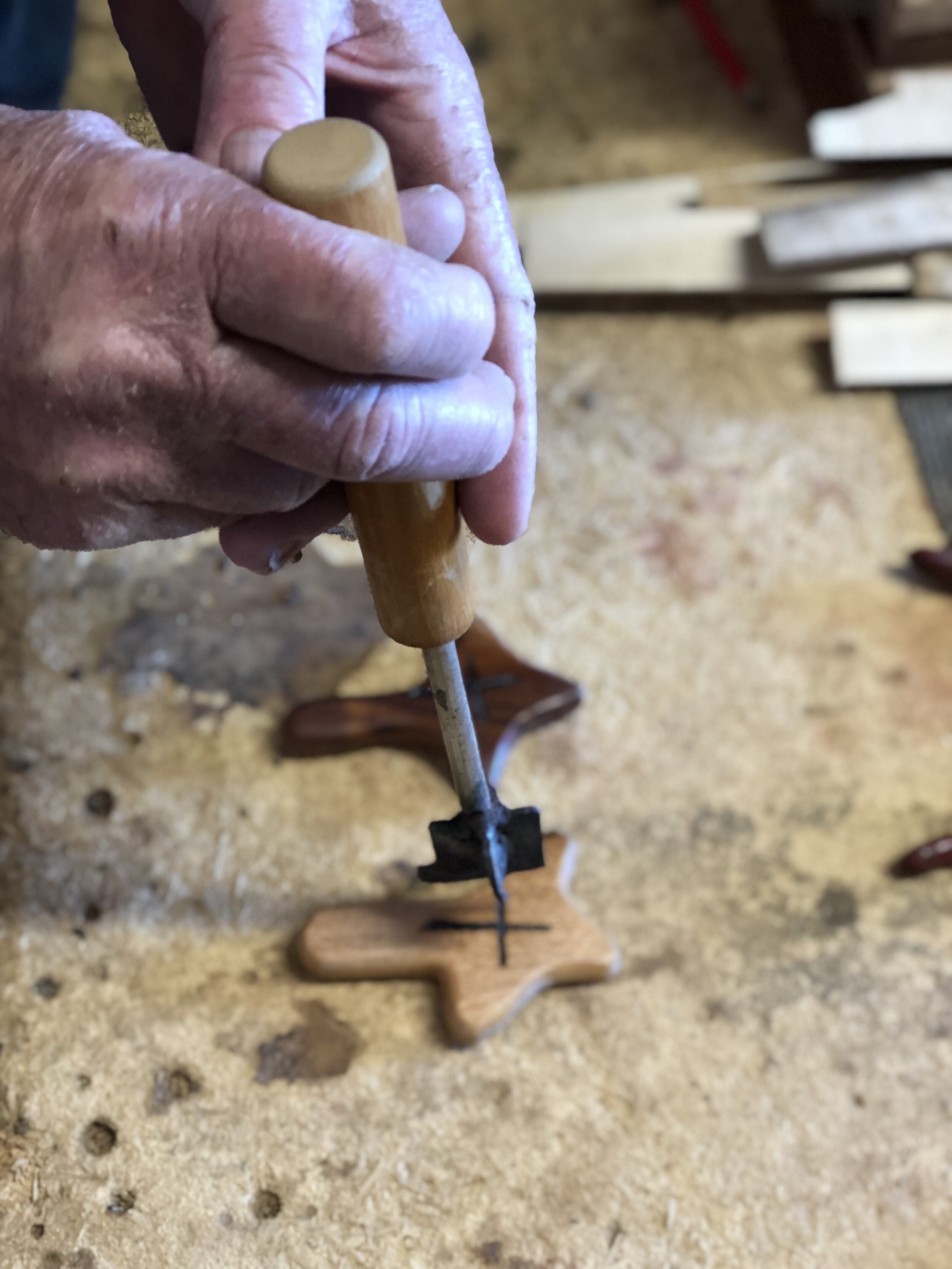The Cross Of Comfort
This basket of palm crosses is located in Coopernook Pop Up Op Shop. It is kept on the counter and visitors to the shop are welcome to pick a cross to keep. Photo | Ainslee Dennis
Slabs of cedar and lengths of silky oak and camphor laurel sit stacked in sawdust. Alan Cross smiles as he surveys the massive shed that is packed with timber and tools collected over a lifetime; nothing is wasted, and in his experienced hands timber off cuts are being transformed to create a symbol of love for people in palliative care.
Thousands of palm crosses have been crafted by Alan Cross in the last three years and are in the palliative care ward of Manning Hospital and all aged care facilities in Taree. Pastor David Freeman sought Alan Cross to create the crosses and says they provide comfort to people in pain.
When people are dying it is not always possible for someone to be there with them. I saw a need for it and it is an alternative to something like rosary beads, where people feel comfort and calmness when they have something to hold.
The palm crosses are made to sit comfortably in the palm of your hand. Alan makes little ones, big ones, light ones, dark ones - it's amazing how people see and respond to them, one will just catch the eye of a person and they will be drawn to it.
They are offered to people when someone is drawing to the close of their life. In terms of reactions, firstly it will depend if the person can speak as there are a lot of people in palliative care who can no longer express themselves or vocalise what they want.
“You will see some people grab it and really hold it hard in their hand, while others will almost caress it.”
You will see some people grab it and really hold it hard in their hand, while others will almost caress it. It's wonderful when you see it, there is a response that's like calmness.
When staff can identify that someone is a Christian, or that a person is looking for some form of spiritual connection then the palm cross is offered. It's not for everyone, and it's not about trying to convert someone - it's about trying to give them spiritual assurance and comfort.
It's also really significant for families. Some families will send it with them, and some will hang on to it and say, 'This is the last thing that Mum held.'
Pastor David Freeman and Alan Cross stand in a shed built by Alan on his property in Lansdowne. Alan’s hands are practiced at creating three styles of crosses to suit different palm sizes. Photo | Ainslee Dennis
Alan is a widely-known and respected woodturner who has been selling his work for around 40 years at the monthly Hub Markets at Taree Showground. His massive 80 metre by 40 metre shed in Lansdowne is where he works to create the palm crosses. Alan, where is the timber sourced and how long does it take to craft each palm cross?
I use off cuts of timber from the Manning Valley and Wauchope areas, mostly red cedar, camphor laurel and silky oak. Probably from start to finish it would take me at least half an hour to make a cross but I make them in batches as it's easier to do about 200 in one go.
I trace them out using templates, then I hand cut each one with a bandsaw. I sand them to get them shaped up before I do the rounding over with the router, and then I sand again on the wood lathe with a flexible disc before I burn a cross into both sides with the oxy torch. I made the metal cross, and to get it hot enough to burn the wood I clamp it in a vice, and heat it with the oxy torch until it's red hot - I can do about five before I have to reheat it. I then spray them with lacquer. There are so many stages to it, and it's not something you can do in five minutes, so that's why I do them in batches.
What happens when a batch of palm crosses are finished and ready to be used in the community?
When Alan finishes a box of palm crosses he brings them to church and we pray for them. We give thanks for them, thanks for the work Alan has done, and we pray for them with the intention of them being used to bring comfort.
Alan, how do you feel about the impact of your palm crosses on the lives of people?
There is just the joy of knowing that it's going to help somebody and bring them closer to Christ. That's the main thing.
Palliative care is the main focus of the palm cross ministry, however Pastor Freeman says it now plays a part in helping people living with mental illness, scripture instruction in schools, and to support families with people deployed overseas in the Australian Defence Force.
We offer them to people during times of mental health crisis. Not everyone with mental health issues is necessarily Christian, but many are spiritual, and they will look for spiritual symbols in their life and hold on to the palm cross for comfort.
A few people with sons and daughters who have been deployed overseas in the Australian Defence Force have been given them, and they tell me that they hold the palm cross and turn it in their hand every day as they remember their son or daughter.
“We also give them to children in scripture classes when we are trying to help them to understand what the symbol of the cross means.”
We also give them to children in scripture classes when we are trying to help them to understand what the symbol of the cross means; we let kids hold one and then say, 'you can have that, it's yours to keep' - so many kids treasure it.
I've gone back and done the same class a couple of years later and again offered them a cross, and some kids will say, 'oh no, I've still got mine and I don't need another one!' They really see it as something special, and so do we.














